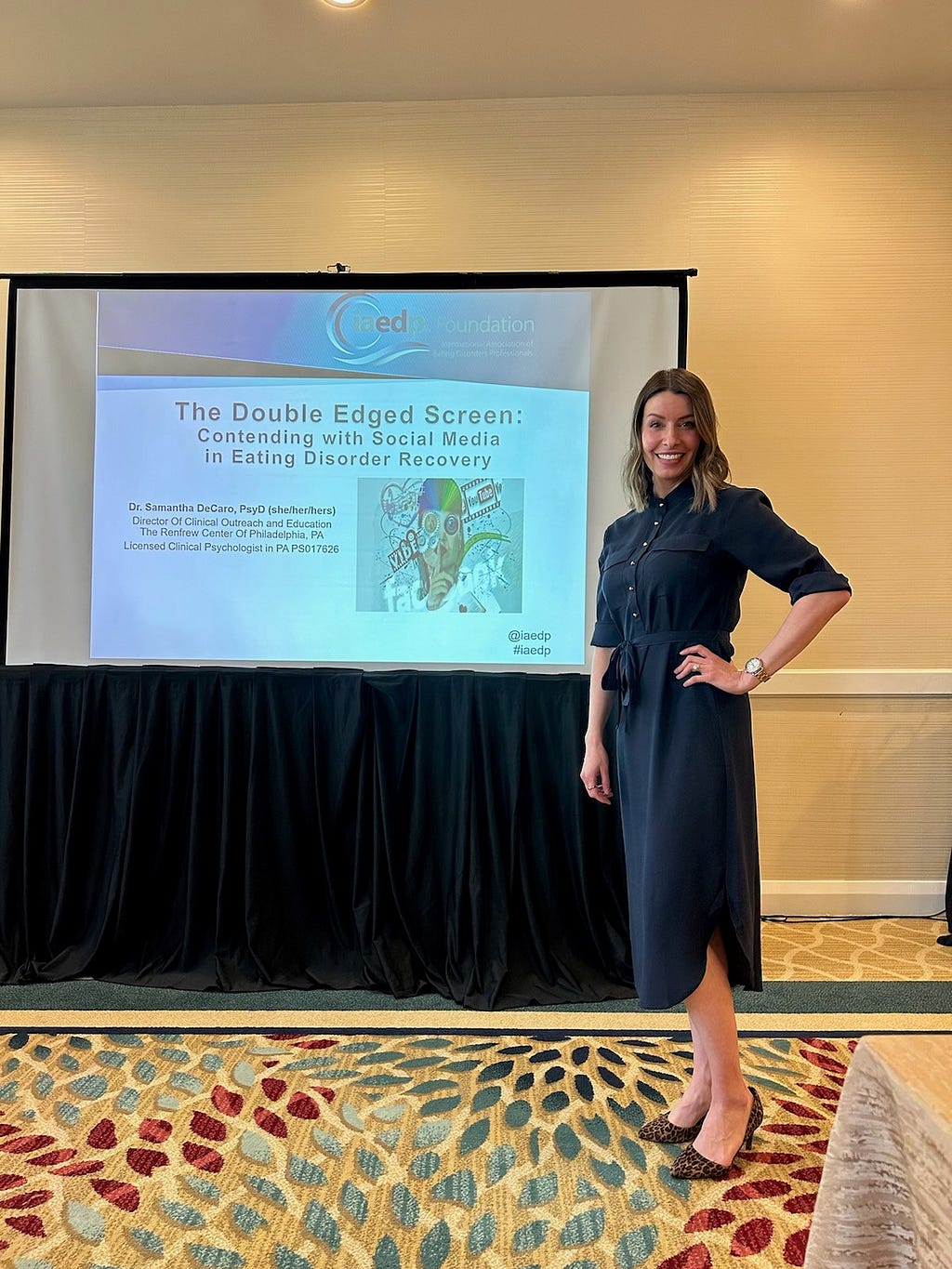Samantha DeCaro of Renfrew Center On How To Support A Loved One Who Is Struggling With An Eating Disorder

Be Kind. Talk to the person when you are calm rather than frustrated or emotional. Keep in mind that the person with an eating disorder may feel especially sensitive to real or perceived criticism, irritation, or rejection.
Eating disorders are complex mental health conditions that affect millions worldwide, transcending age, gender, and cultural boundaries. They are not simply about food but involve a range of psychological, physical, and social issues. Supporting a loved one through this struggle can be challenging, requiring understanding, patience, and knowledge of the right approaches to truly make a difference.
In this series, we aim to shed light on the most effective ways to offer support, understanding, and hope to those battling an eating disorder. We are talking to psychologists, nutritionists, doctors, therapists, and survivors, who can provide valuable perspectives on nurturing recovery, fostering resilience, and promoting healthy relationships with food and body image. As a part of this series, we had the pleasure of interviewing Samantha DeCaro.
Samantha DeCaro, PsyD, is the Director of Clinical Outreach and Education at The Renfrew Center. Dr. DeCaro received her Bachelor’s degree in Psychology at LaSalle University, and her Doctoral degree in Clinical Psychology at the California School of Professional Psychology in San Diego, CA. She has been with Renfrew since 2012, completing her post-doctoral residency at The Renfrew Center Philadelphia — Spring Lane, then holding the position of Primary Therapist, and most recently serving as Assistant Clinical Director. As Renfrew’s national spokesperson, Dr. DeCaro has been featured in the media as an eating disorder expert on various television shows, radio programs, podcasts, and online magazines. She is a frequent lecturer and serves as the Alumni Representative for The Renfrew Center of Philadelphia.
Are you working on any exciting new projects now? How do you think that will help people?
I am so excited for the opportunity to co-host the All Bodies. All Foods. Renfrew Podcast. All Bodies. All Foods. covers topics related to eating disorders, body image and mental health. At The Renfrew Center, we believe true healing exists through community. Because of this, we created a space for all bodies to come together authentically and purposely to discuss various areas that impact us on a cultural and relational level. I am honored to host this podcast with my colleague and sit down with different experts in the field and those in recovery to learn, educate, and spread awareness.
Eating disorders have long been a mental health crisis in the world and in our country. However, we are seeing new risk factors recently.
- Social media exposes its users to ideal body types and various forms of disordered behaviors. It’s nearly impossible to navigate these platforms in a healthy way without strong media literacy skills. Recently we’ve seen trends such as, ‘What I eat in a Day’ videos and ‘Leggings Legs’ that send harmful messages about what we should eat and how our bodies should look in certain clothing. I have no doubt we will see this again this summer as swimsuit season approaches and “beach bodies” begin trending. Photo and video editing and AI have also made it more difficult to decipher what is real and what is not. We are seeing many users change their body shape, contributing to the harmful belief that ideal body types are easily achievable and sustainable for everyone. Social media can be a space of community, creativity, and connection, but without the education and awareness of how to spot problematic messages, many young people are not able to decipher the difference between wellness and diet culture, making them prone to disordered eating behaviors.
- We know that those who occupy marginalized identities are at elevated risk for eating disorders and disordered eating. For example, members of the LGBTQIA+ community face various minority stressors, including bullying, harassment, violence, and sometimes rejection from their church and family. Disordered eating and the pursuit of society’s “ideal body” can sometimes function as attempts to manage or numb emotions associated with these experiences and mitigate harm. According to The Trevor Project, 29% of transgender women and 33% of transgender men suspect they have an eating disorder.
- Historically, the “thin ideal” has been presented to us in the form of a young, white, thin, able-bodied woman. Although body ideals have shape shifted through the years, they largely remain unattainable or unsustainable for most of the population, yet impact people of all sizes, genders, races, and ethnicities. It’s estimated that 20–26% of those with eating disorders are Black, Indigenous, and People of Color. In addition, research suggests that those who experience weight-based stigmatization are at elevated risk for eating disorders and disordered eating. These numbers can be attributed to marginalized bodies facing higher rates of stigma, hate crimes, harassment, and discrimination in their everyday lives.
Based on your insight, what concrete steps can a) individuals, b) corporations, c) communities and d) leaders do to address the core issues that are leading to this problem?
-1 general statement- education piece and giving space for healing
We all need to continue to educate ourselves on the signs and symptoms of eating disorders and understand that these complex illnesses cannot be detected simply by looking at someone. When we learn, listen, and show up for each other, we can create a safe space for empathy, connection and healing.
As you know, one of the challenges of an eating disorder is the harmful and dismissive sentiment of “why can’t you just control yourself?” What do you think needs to be done to make it apparent that an eating disorder is an illness just like heart disease or schizophrenia?
Eating disorders have long been misunderstood; there is a longstanding myth that eating disorders only affect thin, upper class, white, young cisgender women. However, eating disorders can affect anyone of any size, age, race, gender, socioeconomic status, or background. Eating disorders are also the second most deadly mental illness second only to opioid use disorder. We need to continue raising awareness to the devastating effects of these illnesses and help people to understand that eating disorders are not simply about food or weight. They can develop as a way to cope with or avoid distressing emotions and experiences. By learning and listening, we can create an environment where people are not afraid of being judged or doubted when they reach out for help, and treatment will be more accessible.

Can you please share with our readers 5 ways to support a loved one who is struggling with an eating disorder? If you can, can you share an example from your own experience?
1 . Be Kind. Talk to the person when you are calm rather than frustrated or emotional. Keep in mind that the person with an eating disorder may feel especially sensitive to real or perceived criticism, irritation, or rejection.
2 . Be non-judgmental. Don’t talk about appearance or weight. Instead talk about mental health, relationships, and mood. For example, “I’ve notice you seem down lately and are not spending as much time with your friends. How have you been feeling?”
3 . Be realistic. Realize that change can be difficult and motivation often fluctuates. You can help them identify the positive reasons for changing and some of the negative consequences of staying the same.
4 . Be supportive and caring. Be a good listener and don’t give advice unless you are asked to do so. Be compassionate because they might not immediately want or appreciate your support.
5 . Acknowledge that recovery is hard work. Help them find resources, identify specialists in their area, or accompany them to an assessment appointment or treatment center tour. Validate their fears but emphasize that recovery is possible, and they do not need to do it alone.
How do you navigate the balance between offering support and respecting the autonomy of a loved one with an eating disorder?
Trying to take on the role of the “food police”, therapist, or nutritionist will not be helpful and will likely damage trust and create ruptures within your relationship. Never underestimate the power of simply validating, connecting, and loving them through this. Eating disorders are ideally treated at the appropriate level of care with a qualified multidisciplinary treatment team. The first step is to gently, yet steadily, encourage your loved one to seek out an assessment from a qualified specialist so that they can receive a proper level of care recommendation. Insist that your loved one prioritize their own physical and mental health above all else and encourage them to trust the treatment process. You can support them by offering to help with outside obligations so that they can focus on their recovery. Fully engaging in treatment often requires courage and sacrifice, but calm and consistent support from family and friends can make the experience much easier.
Is there a message you would like to tell someone who may be reading this, who is currently struggling with an eating disorder?
You are not alone, and you are deserving of help and treatment.
In your experience, what are the most effective strategies for building resilience and a positive self-image in individuals recovering from an eating disorder?
Body image goes much deeper than our appearance on the outside. It is also a combination of internal experiences. It exists in our minds, and therefore must be addressed there, especially if we’re hoping for a healthier relationship with our body and sustainable improvement to our self-worth.
Through therapy and treatment, we can practice skills to focus on the way our thoughts, feelings, and behaviors interact. Once we understand how they are connected, we can practice thinking more flexibly, processing our feelings and experimenting with new behaviors. It’s important to accept and lean into our emotions, regardless of how distressing. By doing this, we can build emotional tolerance instead of turning to eating disorder behaviors to dampen or avoid them.
What are your favorite books, podcasts, or resources that have helped people with this struggle? Can you explain why you like them?
I can recommend our Renfrew blog, where we have posts written by Renfrew clinicians and alumni, as well as an entire library of resources for professionals, families, and those struggling. I’d also recommend our podcast, All Bodies. All Foods. A few books that have helped those who are struggling:
Body Positive Power by Megan Jayne Crabbe — By boldly sharing her own journey to eating disorder recovery and her path to body positivity, Megan uplifts and inspires her readers to embrace our own bodies and celebrate body diversity.
The Courageous Path to Healing by Jennifer Kreatsoulas, PhD — In this vulnerable and authentic recovery story, Jennifer shares the inevitable ups and downs of recovery and offers reflective prompts and tools throughout the book.
Intuitive Eating: A Revolutionary Program That Works EVELYN TRIBOLE, MS, RD & ELYSE RESCH, MS, RD, FADA — Outlines the 10 principles of intuitive eating to help you walk away from diet culture, make peace with food, and respect your body.
How can our readers continue to follow your work online?
You can visit www.renfrewcenter.com and visit our podcast page to tune in to All Bodies. All Foods. And reach out to us if you or a loved one are struggling with an eating disorder.
Thank you so much for these insights! This was so inspiring!
Samantha DeCaro of Renfrew Center On How To Support A Loved One Who Is Struggling With An Eating… was originally published in Authority Magazine on Medium, where people are continuing the conversation by highlighting and responding to this story.
